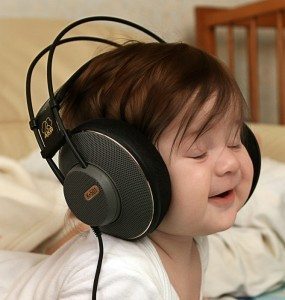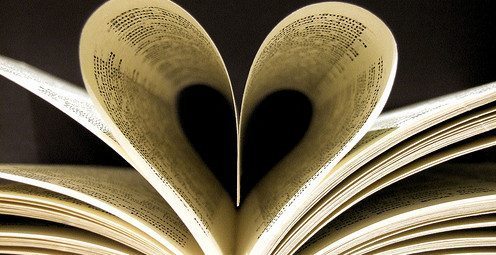Audio killed the paperback star?
Reading rules! – Nicole Davis
[dropcap]R[/dropcap] eading is, for me, a distinctly material pleasure. I enjoy thumbing through the pages and checking to see how much I’ve read and how much I’ve left to go. I like seeing creases in the spine; indicative of a novel well-perused. And I take great satisfaction from publicly reading a book wherein the cover is available for all to see. Yes, yes I am reading (insert intellectual title, or daunting classic).
If you’re merely listening to the material, however will people know you’re not just caressing your ears with some Kanye or catching up on a radio podcast? How will that cute guy approach you in a cafe because you’re reading Dorian Gray and he recently enjoyed it immensely?!
But even in the safe confines and privacy of my bedroom, I find I engage more with a book if I approach it as a tangible experience. I would find it too easy to tune out of an audio book and start indulging in my own thoughts. True, I often drift from the page too – a scandalous conversation on the bus, and suddenly I find I’ve skipped 20 pages without absorbing a single sentence – however I personally find it more rewarding to turn each page and savour each line. There’s no turning back to re-read a brilliantly crafted piece of prose without the task of pausing and rewinding, and there’s no folding down the corner of your favourite moment and returning to it months, years later, with that personalised touch.
Academic studies and surveys have confirmed that there is no significant difference in comprehension of a text whether enjoyed aurally or visually and those that listened to a book were able to summarise the plot just as capably. But it’s not understanding that I dispute that reading a book privileges, it’s that which is otherwise gained.
[pullquote style=”right” quote=”dark”]For me reading is that time when you can tune out, not tune in; when you can utterly lose yourself...[/pullquote]
I often listen all day long. To music on the bus journey into campus, to a lecturer summarising Nietzsche’s theories, to friends piecing together antics from the night before. My ears are assaulted with melodies and sounds throughout most of the day, whether I’d like for them to be or not. For me reading is that time when you can tune out, and not tune in; when you can utterly lose yourself in the world that someone has created.
Reading is my private sanctuary. With book in hand and often in front of face, it says, ‘sorry world, but I’m indulging in something far more exciting’, ‘I am a literary soul and I wish for you to know it’, ‘Yes I have made it 250 pages into Ulysses and I’m still going’.
Another problem I see with audio is that someone else’s voice, their intonations and interpretations, intrude on your perspective of the novel. I don’t particularly want to experience a book with the added emphasis that Stephen Fry gives it, I want to see it through my own eyes and infer from it what I will.
Furthermore, it’s more educational. Teaching a child to read is one of the greatest gifts you might ever bestow on them; if they think they can be lazy and just listen to the novel, you’re taking away the chance to see words, to learn how they’re spelt and see how sentences are formed. Sight is sense often taken for granted, and to neglect reading would be to render it somewhat useless. But don’t take my word for it, pick up a book and see for yourself.
[divider]
Listen Up! – Carmella Lowkis
[dropcap]I[/dropcap] will always be one of the first in line to defend books: books are brilliant. How- ever, brilliance is not synonymous to convenience.
Have you ever tried to multitask whilst reading a book? It’s next to impossible! In order to read, you have to devote your entire ocular attention to the page; one glance up, and you’ve lost your place. This isn’t an in- trinsically bad thing – in fact, getting lost in a book is part of the joy of reading – but there are some situations where it causes problems. Missed stops on the bus; burned dinners in the oven; a dog which has taken advantage of your distraction to steal the last slice of cake: all of these are the potential dangers of reading. Audiobooks are far less hazardous. Once you remove the visual dependency, you are granted simultaneous access to reality and fiction.
 Another factor preventing the reader from multitasking is the demand that reading makes upon your hands. If you have to turn the page every few paragraphs, it becomes quite tricky to keep up another manual activity in the meantime. Even digital devices, such as the Kindle, require a hands-on approach. Because of this, you are often forced to put down your book when it’s time to do the chores – a problem which doesn’t exist when it comes to audiobooks. With the hands-free nature of headphones, iPods, and even CD players, an audiobook allows you to per- form tasks which a physical book prevents. Arduous activities like ironing, vacuuming, and tidying are far more interesting when they come hand-in-hand with fiction. Moreover, this provides a fun new way of measuring time. How long does it take me to do the ironing? Five chapters of The Prisoner of Azkaban. This information is invaluable when assessing the relative worth of chores.
Another factor preventing the reader from multitasking is the demand that reading makes upon your hands. If you have to turn the page every few paragraphs, it becomes quite tricky to keep up another manual activity in the meantime. Even digital devices, such as the Kindle, require a hands-on approach. Because of this, you are often forced to put down your book when it’s time to do the chores – a problem which doesn’t exist when it comes to audiobooks. With the hands-free nature of headphones, iPods, and even CD players, an audiobook allows you to per- form tasks which a physical book prevents. Arduous activities like ironing, vacuuming, and tidying are far more interesting when they come hand-in-hand with fiction. Moreover, this provides a fun new way of measuring time. How long does it take me to do the ironing? Five chapters of The Prisoner of Azkaban. This information is invaluable when assessing the relative worth of chores.
There even some times when, although reading a physical book is possible, I would argue that an audiobook is preferable. I’m sure that any seasoned reader such as myself is familiar with the difficulty of finding a comfortable reading position. Sitting, slouching, hunching, reclining – every possibility leads to some form of discomfort. With an audiobook, you can flop down any which-way; no compromise need be met. With a couple of iPod speakers, the audiobook even solves the age-old problem of how to read in the bath. Say good- bye to wet books, and hello to maximum comfort.
Finally, there is no shame in admitting the obvious benefit of audiobooks: they require less effort. It’s so much easier to sit back and let another person do the hard work – especially when it comes to dense or difficult texts. I know that, as a literature student, I shouldn’t say this, but I would never have made it through Wuthering Heights if it wasn’t for the audiobook! Perhaps audio-books are the lazy option, but whoever said that it’s wrong to be lazy from time to time?

Comments